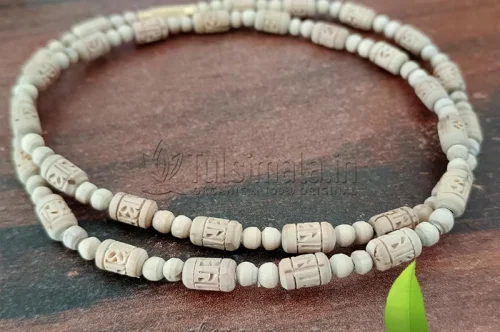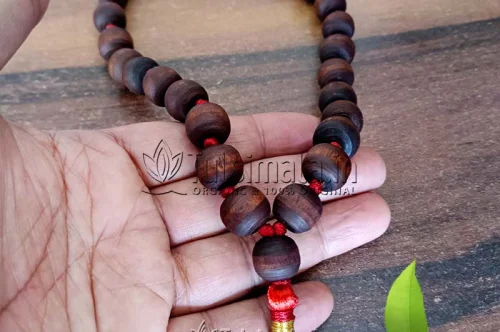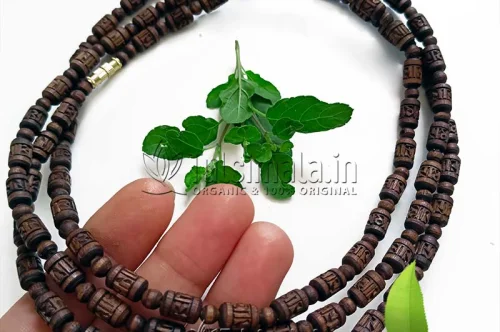How many types of Tulsi Kanthi Mala?

Tulsi Kanthi Mala is a religious neckwear mala made from the stems or wood of the Tulsi plant, also known as Holy basil, it has great significance in Hinduism, especially among Vaishnavas, and the devotees of Lord Vishnu and his avatars like Krishna and Rama. This mala is usually worn over the neck as a symbol of devotion, purity, and protection from evil.
Different Types of Tulsi Kanthi Mala:
- One Round Tulsi Kanthi Mala: Usually worn by beginners who just started doing devotional practices.
- Two Round Tulsi kanthi Mala: Worn by devotees who are in intermediate phase.
- Three Round Tulsi Kanthi Mala: Worn by devotees who has taken diksha and follows proper devotional rules and regulations.
- Bead Size and Shape: Available in fine, oval, round, or long beads, with different bead sizes Tulsi Kanthi Mala.
- Tulsi Lockets and Tulsi Pendants Mala: Some locket malas are engraved or carved with the names or images of gods, such as Radha, Krishna, Sita Ram, Vitthal, Hanumanji, etc.
- Tulsi Japa Mala: Used for chanting (japa), these usually have 27, 54, or 108 beads plus one extra (Guru bead or Sumeru bead).
Spiritual Benefits
- Connection with God: Tulsi is sacred in Hinduism and associated with Lord Vishnu and Krishna. Wearing the mala promotes devotion and attracts positive energies.
- Purification: Tulsi beads are believed to purify the mind, body, and soul, removing negative energies.
- Cleansing sin: According to scriptures like the Skanda Purana, wearing Tulsi beads helps to cleanse sins and increases spirituality.
- Meditation: The mala helps in mantra chanting (japa), deepening focus and spiritual experiences during meditation.
- Protection from Evil: It is said to ward off evil spirits, nightmares, black magic, and negative vibrations.
Common Uses
- Spiritual Practice: Tulsi Japa Mala is used for chanting mantras, especially the Hare Krishna Mahamantra, and for meditation.
- Daily Wear: Many devotees wear Tulsi Kanthi Mala at all times as a sign of their faith and for spiritual protection.
Tulsi Kanthi Malas are considered sacred. Devotees avoid removing them and treat them with respect, as Tulsi is believed to be a beloved devotee of Krishna and a source of spiritual purity.
 English
English Hindi
Hindi







